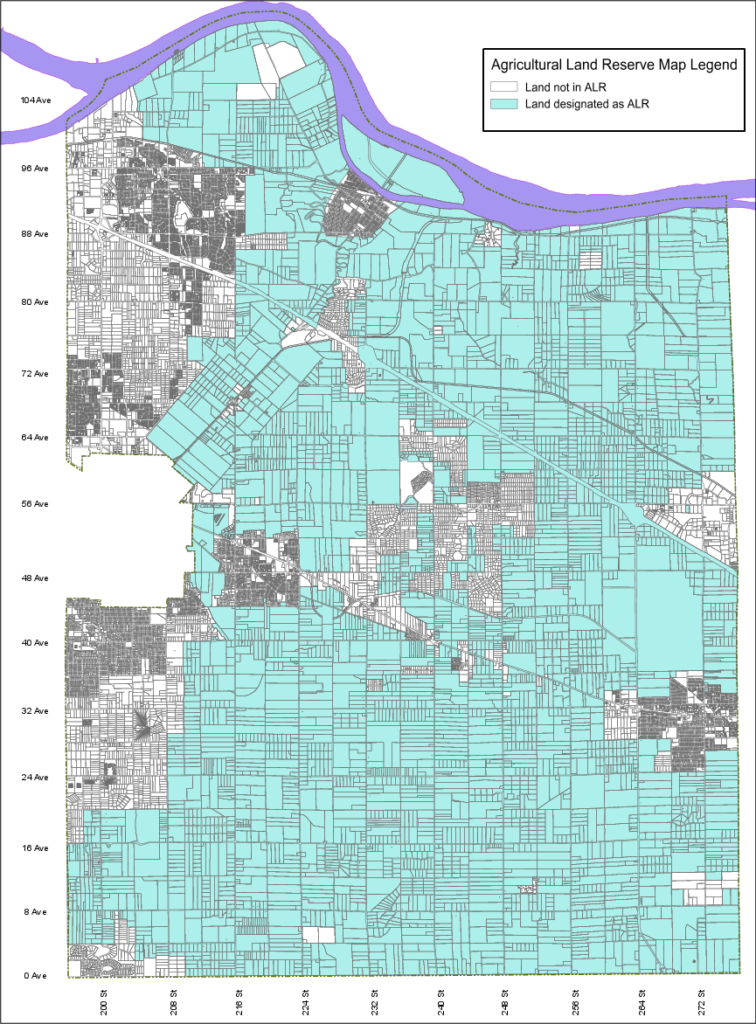As a longtime resident (and retired two-term Township councillor) of Langley, few things make me roll my eyes more than out-of-towners claiming Langley is full of suburban sprawl, destroying the environment, and/or gobbling up precious farmland.
These lectures are especially obnoxious when coming from Vancouver elitists, living in a city that happened to be shaped before much attention was paid to the environment. While Langley planners today agonize over protecting and restoring every inch of stream possible, Vancouver and railway companies filled in a huge swath of False Creek, destroying the ecosystem there.
Still, Langley is the bad guy.
Meanwhile, Langley today is growing in clustered community pockets bordered by huge swaths of agricultural land. Nearly 80% of the Township is in the Agricultural Land Reserve, making it essential that Langley maximize its urban pockets in order to offer any semblance of affordable housing for 110,000+ residents.

For years, Langley Township has seen far more multi-family homes being built than single family ones. They get little credit from the region for this commitment to density – but a lot of criticism from residents who want to pull up the drawbridge now that they live there.
That’s life in local politics.
I was reminded of these frustrations when reading about the NDP Government’s ham-fisted plans for the Agricultural Land Reserve (ALR). The ALR has long been a cornerstone of NDP ideology, birthed by the 1970s Dave Barrett government and sacrosanct ever since.
Having been relegated to opposition for 16 years, the current crop of NDP activists were chomping at the bit to get their hands on ALR legislation and strip even more private property rights.
First, it was restrictions on house sizes on these massive properties. As I wrote last fall, the NDP’s decision to cap the size of homes on farmland was an outright attack on Indo-Canadian families. What I wrote then still stands:
While NDP politicians and mainstream media call them “mega-mansions,” many Indo-Canadian farmers call them home.
Many South Asian families value their multi-generational living quarters; grandparents, parents, and children all living together under one roof. Parents are expected to support their children until the day they get married; the eldest son is expected to care for his parents until they pass away.
This makes large homes important; limiting them is an attack on their way of life.
Now the NDP are planning to ban private property owners from applying to the Agricultural Land Commission for removal of land from the ALR. Under their plan, only governments – provincial, municipal or Indigenous – will have the ability to even apply.
This is absurd. A property owner should have every right to ask the Land Commission to review the status of a property (and the Commission should have every right to reject an application based on its merits, or lack thereof).
But to refuse to even hear the application? That’s not democracy, that’s dictatorship.
The Commission is prone to doing dumb things – see this example of it spending thousands of taxpayer dollars to try and prove that 1.997 was somehow more than 2 – but it should still hear applications from landowners. Every landowner. Any time they want. That’s fair.
The bulk of the Lower Mainland’s farmland is south of the Fraser River wrapped around communities like Langley, Surrey, Delta and Abbotsford. These are also cities expected to take on a large percentage of the region’s population growth.
Time marches on, and innovation and understanding of our effects on the environment grow every year. Just as Vancouver would never today fill in False Creek, and just as the agriculture industry has rapidly transformed in the past three decades, so must public policy remain flexible and open to change.
Cutting private property owners out of the process of offering innovative, interesting and potentially societally-valuable ideas seems like a bad way to go.
Will there always be some ALR landowners who just want to rip out a few acres and make a profit? Sure – but the Commission can say no.
Could there be other ALR landowners, genuinely committed to farming, who come up with radically innovative options to secure farming’s future in an ever-changing world. Of course – and the Commission should at least be open to hearing those ideas.
Jordan Bateman has a long history of public policy work, championing small business and fiscal responsibility. Currently the Vice President, Communications & Marketing for the Independent Contractors and Business Association (ICBA), Jordan also served six years as the B.C. Director of the Canadian Taxpayers Federation, and was a two-term Langley Township


